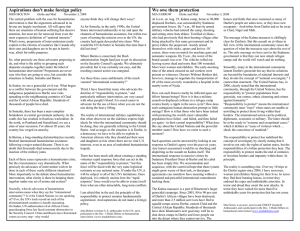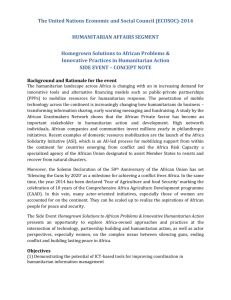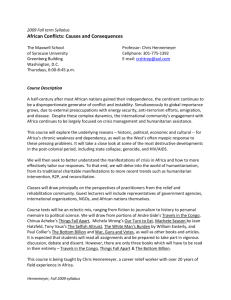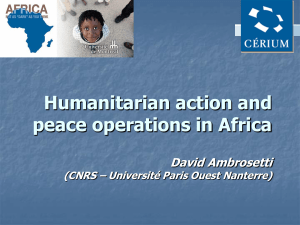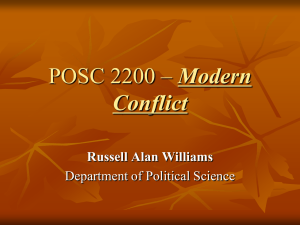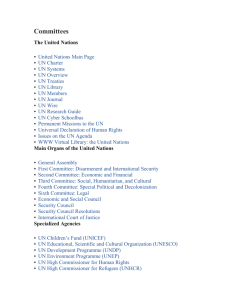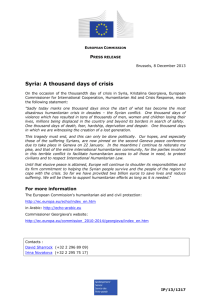Mr. Ripert (France) (spoke in French): Allow me, in turn, to thank Mr
advertisement
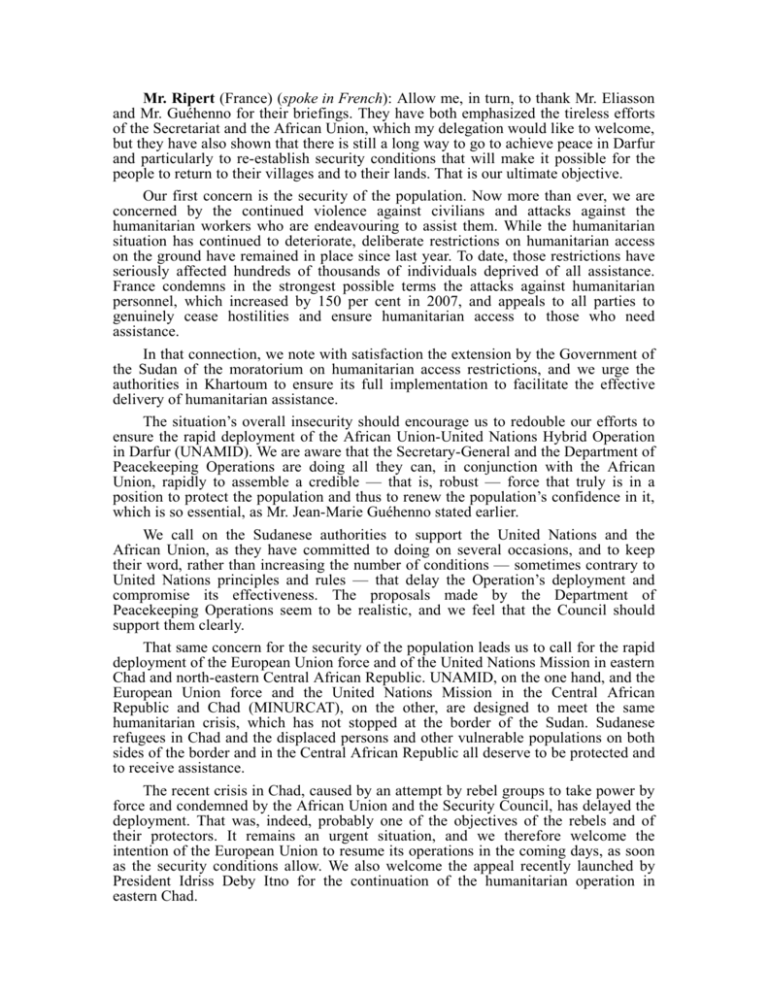
Mr. Ripert (France) (spoke in French): Allow me, in turn, to thank Mr. Eliasson and Mr. Guéhenno for their briefings. They have both emphasized the tireless efforts of the Secretariat and the African Union, which my delegation would like to welcome, but they have also shown that there is still a long way to go to achieve peace in Darfur and particularly to re-establish security conditions that will make it possible for the people to return to their villages and to their lands. That is our ultimate objective. Our first concern is the security of the population. Now more than ever, we are concerned by the continued violence against civilians and attacks against the humanitarian workers who are endeavouring to assist them. While the humanitarian situation has continued to deteriorate, deliberate restrictions on humanitarian access on the ground have remained in place since last year. To date, those restrictions have seriously affected hundreds of thousands of individuals deprived of all assistance. France condemns in the strongest possible terms the attacks against humanitarian personnel, which increased by 150 per cent in 2007, and appeals to all parties to genuinely cease hostilities and ensure humanitarian access to those who need assistance. In that connection, we note with satisfaction the extension by the Government of the Sudan of the moratorium on humanitarian access restrictions, and we urge the authorities in Khartoum to ensure its full implementation to facilitate the effective delivery of humanitarian assistance. The situation’s overall insecurity should encourage us to redouble our efforts to ensure the rapid deployment of the African Union-United Nations Hybrid Operation in Darfur (UNAMID). We are aware that the Secretary-General and the Department of Peacekeeping Operations are doing all they can, in conjunction with the African Union, rapidly to assemble a credible — that is, robust — force that truly is in a position to protect the population and thus to renew the population’s confidence in it, which is so essential, as Mr. Jean-Marie Guéhenno stated earlier. We call on the Sudanese authorities to support the United Nations and the African Union, as they have committed to doing on several occasions, and to keep their word, rather than increasing the number of conditions — sometimes contrary to United Nations principles and rules — that delay the Operation’s deployment and compromise its effectiveness. The proposals made by the Department of Peacekeeping Operations seem to be realistic, and we feel that the Council should support them clearly. That same concern for the security of the population leads us to call for the rapid deployment of the European Union force and of the United Nations Mission in eastern Chad and north-eastern Central African Republic. UNAMID, on the one hand, and the European Union force and the United Nations Mission in the Central African Republic and Chad (MINURCAT), on the other, are designed to meet the same humanitarian crisis, which has not stopped at the border of the Sudan. Sudanese refugees in Chad and the displaced persons and other vulnerable populations on both sides of the border and in the Central African Republic all deserve to be protected and to receive assistance. The recent crisis in Chad, caused by an attempt by rebel groups to take power by force and condemned by the African Union and the Security Council, has delayed the deployment. That was, indeed, probably one of the objectives of the rebels and of their protectors. It remains an urgent situation, and we therefore welcome the intention of the European Union to resume its operations in the coming days, as soon as the security conditions allow. We also welcome the appeal recently launched by President Idriss Deby Itno for the continuation of the humanitarian operation in eastern Chad. Clearly, Darfur will not achieve lasting stability without the conclusion of the political process being conducted by Mr. Eliasson and Mr. Salim Ahmed Salim. We call on all parties to face up to their responsibilities. Each side states that it is acting in Darfur’s interest; they must now prove it. Those who continue to engage in violence must lay down their weapons immediately, in keeping with their successive public commitments. Those who have stayed away from the negotiating table should join it while there is still time. France, for its part, is working to that end, as requested by Mr. Eliasson and Mr. Salim. My delegation would like to reiterate its support for the approach taken by the two mediators to bring civil society into the discussion. We strongly support the idea that the political process involves not only the warring parties, but also representatives of the victims of the violence and who are the very reason for our commitment to resolving the crisis. In particular, the voices of those hundreds of thousands who have been displaced must be heard. Lastly, my delegation ardently hopes that the crimes committed in Darfur will not go unpunished. The International Criminal Court should pursue its activities with regard to the most serious crimes, some of the perpetrators of which are unfortunately still being protected by the Sudanese authorities. Before concluding, and on a happier note, allow me to join others in wishing our colleague and friend, the Ambassador of Croatia, every success in her future work at the United Nations in defending our principles and the values of human rights and human dignity.
